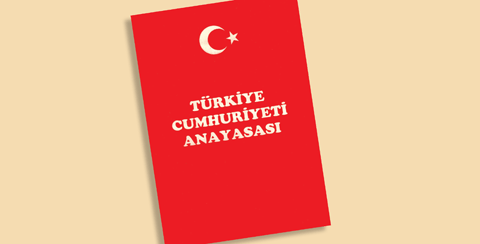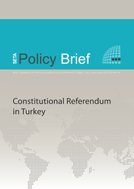Constitutional
Constitutional

Turkey’s Constitutional Referendum of 2010
| Domestic PolicyThe study of the September 2010 constitutional referendum results revealed significant clues as to what could be the results of the June 2011 general elections.
-
Domestic Policy
The Constitutional Referendum and Future of Turkish Politics
SETA CONFERENCE Chair: Taha Özhan, SETA Konuşmacılar: İhsan Dağı, METU Ertan Aydın, Pollmark Date: September 22, 2010 Wednesday Time: 14.00 – 15.30 Venue: SETA Foundation, ANKARA
-
Domestic Policy
Prospects of constitutional reform in Turkey
By Hatem EteTurkish politics is currently undergoing a heated political debate on the constitutional reform package (supported by Prime Minister Erdogan's ruling party), which is on its way to a referendum this Sunday. The package includes amendments to 26 articles of the current constitution along. In addition, it would eliminate the controversial Article 15, a ‘temporary' article that has been in the constitution since the 1980's, preventing the prosecution of officials involved in the military coup of 1980. All in all, Sunday's referendum is one of the ruling AK Party's clearest challenges thus far to Turkey's Kemalist establishment. Since the establishment of the Turkish Republic, four new constitutions have been adopted (1921, 1924, 1961, 1982) - the latest two were drafted after military interventions - and numerous amendments have been made. Since the most recent constitution was adopted in 1982, there have been 15 amendment packages, which have affected almost half of the constitution. As such, the debate on the present constitution is not exactly a new one for Turkey, as the public is quite accustomed to constitutional changes and the public debate they generate. To understand, then, why the current package has touched off such a firestorm in Turkish society and led to an intensified political atmosphere, it is important to consider both the ramifications that the current reform efforts has for the political system in Turkey and the historical context.
-
Domestic Policy
Constitutional Referendum in Turkey
By Taha ÖzhanSince the establishment of the Turkish Republic, four constitutions have been adopted (1921, 1924, 1961, and 1982), which were significantly amended by the successive parliaments in light of new developments, yet remained short of meeting universal democratic standards. The last two constitutions were drafted in the aftermath of military interventions, and none of them have been produced out of negotiation, bargaining or a compromise process. Within the framework of the EU reforms, Turkey’s most recent constitution of 1982 has been amended several times – so much so that almost one third of the constitution has been reconstructed. There have been demands for the drawing up of a new constitution from both right and left wing parties, but the idea has never been realized.
Bu Konuda Daha Fazla
-
Constitutional Court and the Closure of Political Parties in...
By Yusuf Şevki HakyemezThis policy brief aims to discuss the limits of the freedom of political parties in Turkey. The political party bans consitute one of the most important problems threatening the freedom of political parties in Turkey. The restrictions on the political parties come to the fore in two different forms: dissolution after the military coups and closure by means of legislation. In the current context of the case opened against the AK Party, it may be possible and advisable to apply an amendment, bringing Turkish jurisprudence in such matters in line with the standards of the European community.












